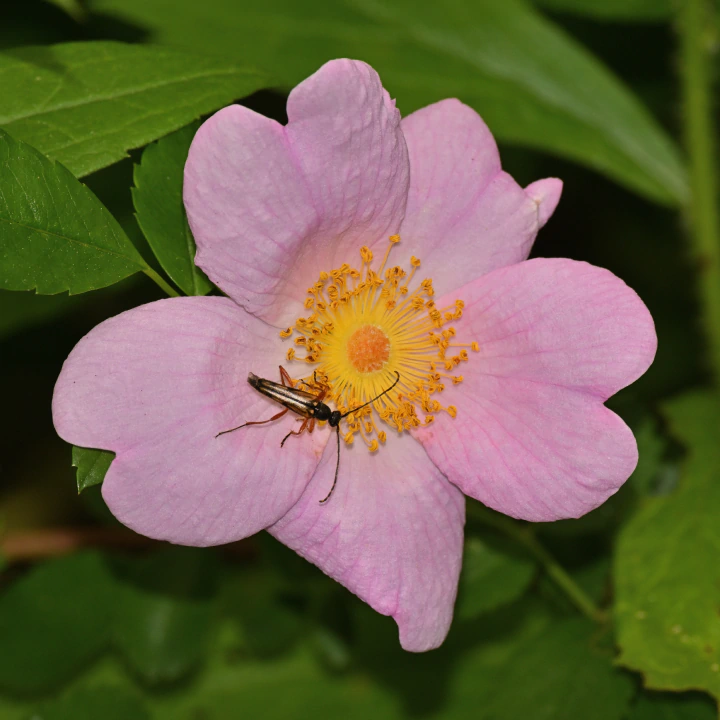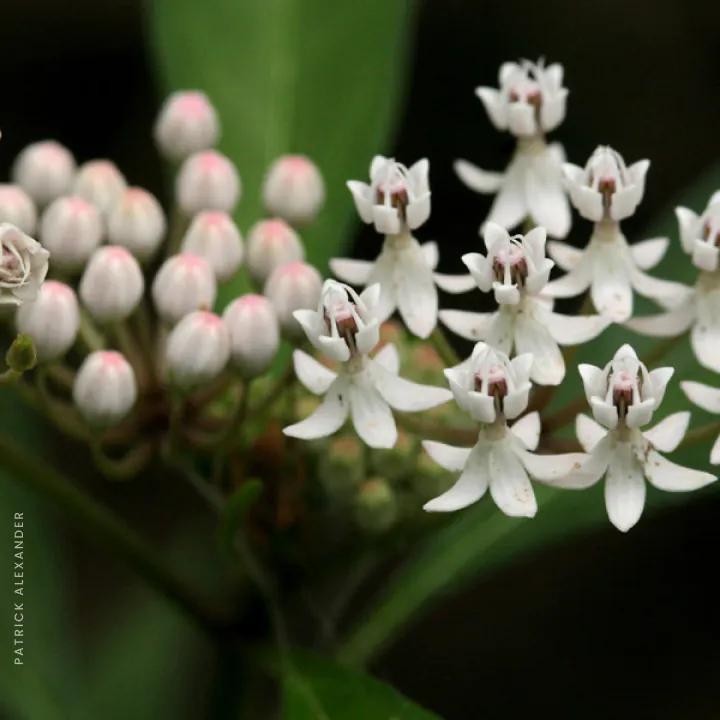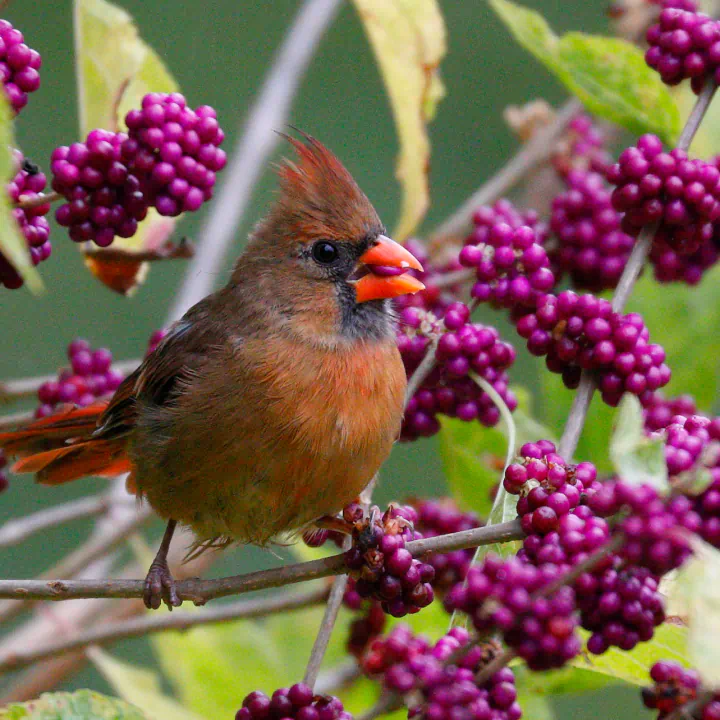Whether you're a seasoned gardener or just starting, our collections offer a variety of plants that will thrive in your Alabama garden.
 Why garden with native plants in Alabama?
Why garden with native plants in Alabama?
Alabama is a treasure trove of biodiversity, boasting over 3000 species of native plants (with 28 species found only in Alabama!). Gardening with these native species offers numerous benefits. They're perfectly adapted to our local soils and climate, requiring less water and fewer fertilizers than non-native species.
Plus, they provide essential habitats and food for our local wildlife, including the beautiful monarch butterflies that migrate through our state.
But that's not all. By choosing native plants, you're also helping to combat the spread of invasive species, which can outcompete our native flora and disrupt ecosystems. So, you're creating a beautiful garden and contributing to the conservation of Alabama's unique natural heritage.
What are the benefits of Alabama native plants?
The benefits of native plants extend far beyond their beauty. Because they've evolved in local conditions, native plants are often more resistant to pests and diseases and are better adapted to the local climate. This means they typically require less water, no fertilizer, and less overall maintenance than non-native species, making them a more sustainable choice for your garden.
But the benefits don't stop there. Native plants play a crucial role in supporting local ecosystems. They provide critical food and habitat for local wildlife, including birds, bees, butterflies, and other insects. The presence of those insects attracts birds and other animals, creating a wildlife-friendly and thriving hub of animal activity in your garden.
How can I avoid planting invasive species?
When shopping for plants, it's important to check whether a plant is native to Alabama or if it's known to be invasive. Reputable sellers should provide this information. You can take a look at our explainer video series titled, From Seed to Shipment: A Native Plant's Journey to You, to find out more about how we ensure that you only get the best native plants for your garden every time.
Remember, the best way to support local biodiversity is to plant Alabama native plants.
Our collections are carefully curated to include only native and non-invasive plants so that you can create a beautiful, eco-friendly garden with confidence. By choosing native plants, you're enhancing your garden and preserving Alabama's unique natural heritage.
Is it difficult to grow a garden in Alabama?
Absolutely not. Gardening in Alabama can be a rewarding experience thanks to the state's diverse climate and rich soils. From the Appalachian foothills in the north to the Gulf Coast in the south, Alabama offers a variety of environments that are perfect for growing a wide range of Alabama native plants.
Alabama's climate varies from subtropical in the south to temperate in the north, which means there's a wide range of Alabama native flowers and plants that can thrive here. Whether you're looking to create a vibrant wildflower meadow or a tranquil woodland garden, you'll find plenty of native plants to suit your needs.
One of the great things about gardening with Alabama state plants is that they're well-adapted to the local climate and soil conditions. This means they're generally easier to care for than non-native species. They've evolved to thrive here, so they're naturally resistant to many local pests and diseases and are often more tolerant of the state's weather extremes.
Whether you're a seasoned gardener or just getting started, a wealth of resources are available to help you on your journey. Our Alabama native plants list above provides a complete collection of plants perfectly suited to Alabama gardens.
So, why not get started on your Alabama gardening journey today? With some planning and care, you can create a beautiful garden that's pleasing to the eye and contributes to the local ecosystem. And if there are some terms you’re unsure about, look at our guide to native plant terms and what they mean.
What is the USDA gardening zone for Alabama?
Understanding the USDA hardiness zones is crucial when planning your garden with Alabama native plants. These zones are defined by the USDA (United States Department of Agriculture) and are based on the average minimum winter temperature. They help gardeners and growers determine what plants are most likely to thrive in a particular location.

Alabama spans USDA hardiness zones 7b to 8b. This means the state experiences average minimum winter temperatures between 5°F and 15°F. This range of temperatures allows a variety of Alabama native plants to thrive. From the cooler mountainous regions to the warmer coastal areas, Alabama's diverse climate can support a rich variety of native flora.
When buying native plants for Alabama, it's essential to check their hardiness zone and ideal growing conditions to ensure they're suitable for your specific area. Planting within your hardiness zone, or choosing part-shade plants for a garden that doesn’t get sun exposure, will increase your garden's success rate and reduce the work required to protect your plants from winter cold or summer heat. It's one of the many reasons gardening with native Alabama state plants can be such a rewarding experience.
Whether creating a colorful wildflower meadow or a tranquil shade garden, understanding your hardiness zone will help you select the right Alabama plants to thrive in your garden. You can also check our guide to native plants and sunlight to ensure you pick only the most suitable native plants for your Alabama garden.
How can I attract wildlife to my garden in Alabama?
Attracting wildlife to your garden in Alabama is a rewarding endeavor that enhances the beauty of your outdoor space and contributes to local biodiversity. The key to attracting wildlife is to create a welcoming environment, and the best way to do this is by planting Alabama native plants.
Alabama native plants are a crucial part of local ecosystems. They have co-evolved with local wildlife and are often uniquely suited to provide the food and other habitat elements that local animals need. From birds and butterflies to bees and other beneficial insects, most animal species rely on native plants for survival in some way.

For instance, monarch butterflies, a beloved sight in many Alabama gardens, have a special relationship with Alabama’s native milkweed species. These butterflies are attracted milkweed, which they use as a host plant for their caterpillars. Milkweed is the only plant monarch caterpillars can eat and without it the butterflies can’t successfully reproduce. Milkweed also provides nectar to adult butterflies.
But it's not just about monarchs. Many Alabama native flowers and other plants are rich in nectar, making them a favorite among various pollinators. By choosing these plants for your garden, you create a buffet for bees, butterflies, and even hummingbirds.
Many Alabama state plants also provide excellent habitats. They offer shelter and nesting sites for birds and insects, and their leaves, seeds, and berries provide food sources for a variety of wildlife.
So, if you want to attract wildlife to your garden, consider buying native plants for Alabama. Check out our Alabama native plants list.
Remember, your pollinator garden can be more than just a beautiful outdoor space. By planting Alabama wildflowers and other native plants, you're creating a mini-ecosystem that supports local wildlife. It's a beautiful way to contribute to preserving Alabama's rich biodiversity right in your backyard.
What water features are suitable for Alabama gardens?
Water features like ponds and birdbaths can be great additions to your garden. They can attract a variety of wildlife, from birds to beneficial insects. Just be sure to maintain them properly to prevent them from becoming breeding grounds for mosquitoes. Check out our guide on using water features to attract wildlife for more ideas and insights.
What are some recommended native plants for Alabama?
When choosing Alabama native plants for your garden, there are many wonderful options to consider. Each plant has unique features and benefits, making it a valuable addition to any garden. Here are some recommendations:
-
Carolina rose: The Carolina rose is a beautiful hardy shrub with pink flowers that is an excellent choice for attracting local wildlife. It's a testament to the beauty and resilience of Alabama native flowers.
-
Pink azalea: Known for its stunning pink blooms, the pink azalea shrub is a favorite among pollinators. It's a wonderful way to add a splash of color to your garden while supporting local ecosystems.
-
Snowy milkweed: This plant is a favorite of monarch butterflies. By planting snowy milkweed, you create a haven for these beautiful creatures and contribute to their conservation.
-
American Beautyberry: This shrub produces beautiful purple berries and is an excellent addition to any garden. The American beautyberry is a wonderful example of the unique beauty of Alabama native plants.
These are just a few examples of the many Alabama native plants you can choose from. By choosing to buy native plants for Alabama, you're not only creating a beautiful garden for yourself, but you're also contributing to the preservation of Alabama's unique environment.
Explore our collections and the Alabama native plants list.



.webp)

